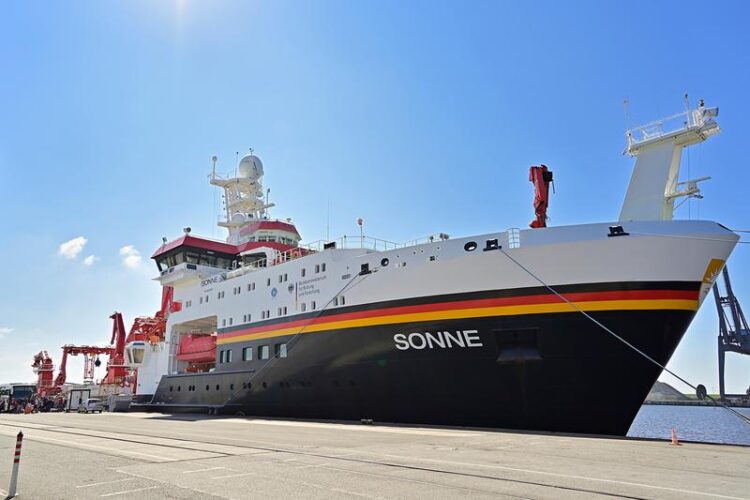Climate change impacts in the South Atlantic

The research vessel SONNE at the port in Emden.
(c) Solvin Zankl
Research vessel SONNE starts expedition to the Benguela Upwelling System.
On 20 August, the German research vessel SONNE sets off on the two-month expedition “SO285” towards South Africa and Namibia. Off the coasts of the two countries lies the Benguela Upwelling System, one of the most productive and fish-rich regions of the Atlantic Ocean. The research team on board the RV SONNE wants to find out how climate change affects the marine ecosystem in order to better assess consequences for fisheries and the ocean’s CO2 uptake. Tim Rixen from the Leibniz Centre for Tropical Marine Research (ZMT) is chief scientist on the cruise, which involves 30 researchers from universities and institutes in Germany, Namibia and South Africa.
Coastal upwelling areas provide about 20% of the annual global fish landings and thus play a significant role in the food supply for the world’s population. Located off Namibia and South Africa is one of these productive ecosystems: the Benguela Current. In the 1970s, however, fishing yields of sardines, which had been caught predominantly until then, declined off South Africa and Namibia. With climate change, other fish species and also jellyfish moved into the region, and the question of the ocean’s capacity to store greenhouse gases such as CO2 arose.
The research expedition “SO285” aims to find answers to the question of how climate change affects the marine ecosystem off South Africa and Namibia and its services with regards to fisheries and ocean CO2 storage. As climate change is gaining momentum and the ocean is relatively slow to respond to it, the research on the RV SONNE is integrated into various long-term observation strategies. These are primarily initiatives of the partner institutions in Namibia and South Africa, but also international programmes with the key goals of improving ocean observation and climate prediction.
The task of the researchers on board the RV SONNE is to decipher processes that help to clarify how the circulation of the ocean under the influence of regional coastal morphology affects the productivity of the marine ecosystem as well as its capacity to store CO2. Understanding such processes is essential to improve predictions and adapt guidelines for the use of marine ecosystems to global change and thus contribute to food security and climate protection.
The research vessel SONNE is owned by the Federal Republic of Germany, represented by the Federal Ministry of Education and Research (BMBF). The operation of the ship and the worldwide deployment of the RV SONNE is coordinated by the German Research Fleet Coordination Centre at the University of Hamburg. Expedition “SO285” is the second voyage in the framework of the research project TRAFFIC („Trophic Transfer Efficiency in the Benguela Current“), coordinated by ZMT and funded by the Federal Ministry of Education and Research (BMBF).
Wissenschaftliche Ansprechpartner:
PD Dr. Tim Rixen Leibniz-Zentrum für Marine Tropenforschung (ZMT)
E-Mail: tim.rixen@leibniz-zmt.de
Media Contact
All latest news from the category: Ecology, The Environment and Conservation
This complex theme deals primarily with interactions between organisms and the environmental factors that impact them, but to a greater extent between individual inanimate environmental factors.
innovations-report offers informative reports and articles on topics such as climate protection, landscape conservation, ecological systems, wildlife and nature parks and ecosystem efficiency and balance.
Newest articles

Innovative 3D printed scaffolds offer new hope for bone healing
Researchers at the Institute for Bioengineering of Catalonia have developed novel 3D printed PLA-CaP scaffolds that promote blood vessel formation, ensuring better healing and regeneration of bone tissue. Bone is…

The surprising role of gut infection in Alzheimer’s disease
ASU- and Banner Alzheimer’s Institute-led study implicates link between a common virus and the disease, which travels from the gut to the brain and may be a target for antiviral…

Molecular gardening: New enzymes discovered for protein modification pruning
How deubiquitinases USP53 and USP54 cleave long polyubiquitin chains and how the former is linked to liver disease in children. Deubiquitinases (DUBs) are enzymes used by cells to trim protein…



